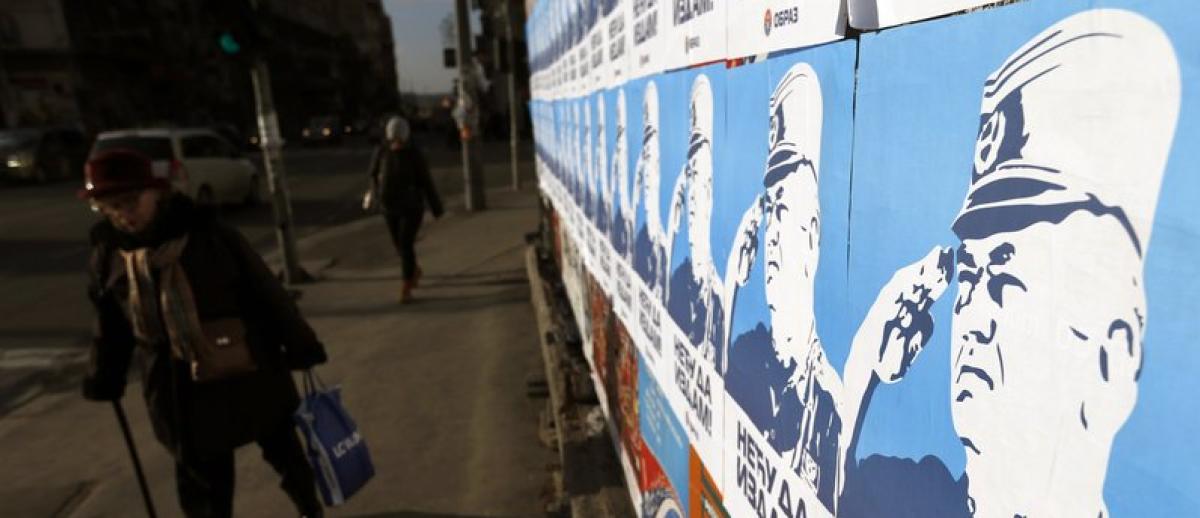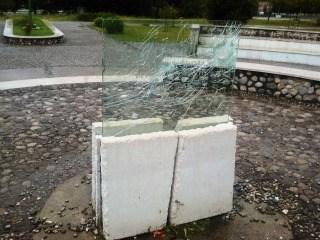Reconciliation in the Balkans: Twenty Years after the Yugoslav Wars, What Went Wrong?
archive


pedestrians pass by posters showing former Bosnian Serb wartime general Ratko Mladic, reading: ″I won’t betray!″ in Belgrade, Serbia, Dec. 6, 2017. Photo: AP/Darko Vojinovic
Reconciliation in the Balkans: Twenty Years after the Yugoslav Wars, What Went Wrong?
There are few post-conflict regions around the world that have received as much international financial and institutional support in the name of peacebuilding and interethnic reconciliation as the territory of the former Yugoslavia. Yet despite massive financial support by the international community and some courageous civil society actors at local levels who have worked towards promoting interethnic reconciliation, very little has been achieved in the past twenty years. How can a region that witnessed such horrendous crimes against humanity in effect develop such a strong culture of denial? How come, even now in 2018, governments across the region are honoring convicted war criminals and giving them a voice in political matters?
The Balkans, as a (geo) political term, has come to be associated with the fragmentation of states and the inability of multiethnic groups to live harmoniously within the same political entity. While for some observers this might be the first and last image that they associate with the region, “Balkan(ization)” as an overt negative label rose to global currency especially during the 1990s.1 This was intrinsically related to the bloody disintegration of the former Yugoslavia, which became a site of horrendous human rights violations, concentration camps, and ethnic cleansing campaigns unseen in Europe since the end of World War II. At the heart of the notion of “Balkanization” lies the presumption that violence, ethno-religious intolerance, and political fragility are somewhat inherent features of the region, and that realistic prospects for sustainable peace are only possible through carefully tailored interventions by major outside political powers.
Indeed, it was genocidal acts such as the Srebrenica massacre in 1995, Europe’s biggest massacre since WWII, and the Reçak massacre in Kosovo in 1999 (among many others) that prompted the main Western powers to intervene militarily in the region to end the violence. Years before military intervention campaigns took place, however, one of the first international mechanisms to deal with the Yugoslav tragedy was the International Tribunal for the former Yugoslavia (ICTY) which was created as early as 1993, in the middle of the Bosnian war. The ICTY was the first war crimes tribunal created by the UN, established to signal that grave breaches of human rights would not go unpunished, even when states are unwilling to prosecute those responsible for orchestrating mass killings, war rapes, and mass expulsions of civilians.
Prosecuting war criminals was deemed crucial for the aftermath of the Yugoslav wars on many levels. Without holding war criminals accountable for their deeds, how would one restore some degree of trust in justice? Without establishing and acknowledging the facts about the heinous crimes committed during the conflicts, how were the successor Yugoslav states ever to reconcile? Without reconciliation, what were the prospects for a sustainable peace in the region? There has long been no doubt even among the most ardent advocates of reconciliation and peacebuilding that judicial mechanisms would be only one important mechanism for facilitating reconciliation processes in the Balkans. The number of war criminals who would stand trial and eventually be convicted would inevitably be small—or in any case, incomparable to the magnitude of the carnage and destruction they wrought throughout the former Yugoslavia in the 1990s. Yet this was an important place to start working on breaking the cycle of violence and the culture of impunity. It was important because domestic courts and the existing hybrid judicial mechanisms across the region were neither willing to nor capable of prosecuting the perpetrators.
Between 1993 and 2017, the ICTY indicted 161 persons and convicted 90, including Serbs, Croats, Bosnian Muslims, and Kosovar Albanians. This included a sitting head of a state, a prime minister, as well as high ranking military generals.2 If the number of Serbs indicted for war crimes at the ICTY was disproportional, this was because the crimes they committed were significantly disproportionate to the ones committed by others, as the mounting evidence showed in the ensuing years. It was not—as some zealous nationalists wanted us to believe—due to tribunal’s allegedly political nature and inherent bias against the Serbs.
There has long been no doubt even among the most ardent advocates of reconciliation and peacebuilding that judicial mechanisms would be only one important mechanism for facilitating reconciliation processes in the Balkans.
Those who had hoped that the facts generated from the trial proceedings at either the ICTY or domestic war crime chambers would shatter walls of denial have been bitterly betrayed by recent developments. One of the main reasons is that political elites have hardly changed in the successor Yugoslav states, and conflicting territorial claims still persist. Today one notices that, with the exception of the deceased or those convicted of war crimes and currently serving their sentences, some of the most influential political figures are the same people who were waging wars during the 1990s. Most have rebranded their political organizations, learned how to speak and present themselves as “pro-Europeans,” and are no longer as overtly chauvinistic in their nationalist rhetoric. But their actions demonstrate how little they’ve changed: they have effectively delegitimized the verdicts and credibility of the ICTY tribunal, used their political influence to interfere in domestic war crime trials, continued attacks on the independent media,3 and are particularly keen to accuse civil society actors and human rights activists of treason or of being a fifth-column for foreign interests when they engage in truth-seeking and truth-telling about what happened during the wars.
Sustaining both a culture of denial and competing narratives about the past are thus what political elites have in common in the successor Yugoslav states of Croatia, Serbia, Bosnia, and Kosovo. The conflicting narratives about the four Yugoslav wars are fortified through public statements and institutional ceremonies, as well as in stone. Since the wars of the 1990s, these governments have erected hundreds of monuments honoring civilian victims and fallen soldiers from within their own ethno-national group. By contrast, there has been only one small glass memorial erected in the name of reconciliation—of all places, in Montenegro’s capital city Podogorica—which pays tribute to civilian casualties who lost their lives during all the Yugoslav wars and carries the pledge “never to be repeated again.” Dishearteningly, the monument was vandalized several times even within the first year of its inauguration.

vandalised 'reconciliation' memorial in Podgorica, Montenegro.
Recent years have seen dramatic developments in the arena of interethnic reconciliation—for the worse. In 2018, a Croat member of Bosnia’s tripartite Presidency, Dragan Cović, received an honorary doctorate from the University of Zagreb. He has a well-documented record of involvement during the Bosnian War. In neighboring Serbia, the government has recently been granting worrisome public space to war criminals. As part of the state-sponsored “internal dialogue” on Kosovo, it has included participation by convicted war criminals such as Vinko Pandurevic, Nikola Šainović, and Vladimir Lazarevic.4
The practice of inviting convicted war criminals to give talks at political rallies in Serbia has prompted multiethnic regional organizations such Youth Initiative for Human Rights (YIHR) to organize protests under the banner “War Criminals be Silent in Order for Victims to Speak.” At one of these events the activists were beaten up, and a misdemeanor court eventually convicted them for having allegedly “disturbed public order and peace.”5
Last but not least, in Kosovo, where the final act of the Yugoslav tragedy played out in the late 1990s, influential political figures initiated a motion in the Kosovo Parliament to repeal the law on Specialized Chambers and the Specialized Prosecutor’s Office (known as the Special Court for War Crimes) in late December 2017. The Kosovo Specialist Chamber is a hybrid court, operating under Kosovo law but with a seat in the Hague, and was established to adjudicate charges against some members of the Kosovo Liberation Army (KLA) for alleged war crimes against Serbs, Roma, and Albanians who were considered political opponents between 1998 and 2000. The unexpected move to abolish the court caught the main international diplomatic circles—who still partly govern Kosovo—by surprise, as it came shortly before Christmas and without prior public debate. This attempt to abolish the law stopped only after Kosovo’s main Western allies exercised pressure on the Kosovar leadership.
Sustaining both a culture of denial and competing narratives about the past are... what political elites have in common in the successor Yugoslav states.
As of 2018, almost two decades since the end of the Yugoslav wars, political elites have effectively limited the space for promoting reconciliation in the Balkans at the political and intra-societal level. Of course, political elites are not solely responsible for the standstill in dealing with the difficult past; equally problematic are the media as well as influential intellectuals and artists, who either out of opportunism or political conviction have served as the mouthpiece of governments. Together they form a formidable political obstacle whose positions must change in order for reconciliation processes to unfold.
Despite the continued pressure against human rights activists and civil society organizations in the last two decades, they have been energetic in truth-seeking and truth-telling as a way to assist reconciliation processes in the region. They have collected testimonies from the families of victims, compiled the names of war casualties and recorded the circumstances of their deaths, and have organized hundreds of events to raise awareness about the importance of dealing with the past. A milestone of such efforts is the Coalition for RECOM, established in 2008. RECOM is a network of more than 2,050 NGOs representing different social groups across the region: human rights activists, lawyers, and associations of refugees and missing persons, to name just a few. The main challenge confronting RECOM is to create a Regional Commission—as an inter-governmental body between the former Yugoslav states—tasked with establishing and acknowledging facts about the killed, missing, imprisoned, and tortured people during the conflicts in the former Yugoslavia. This might indeed represent an ambitious effort to elevate reconciliation from civil society level to a political level, but it is an indispensable step for generating a wider societal debate, without which reconciliation will be difficult to achieve in the Balkans.
1. The term “Balkanization” has come under close scrutiny. The label “Balkans” is not only in one of its variants almost always associated with negative stereotypes, political backwardness, and fragmentations, it is also used incorrectly when describing political developments in parts of Southeast Europe. More precisely, the term “Balkan wars” was more appropriate to describe the wars which occurred in the Balkan Peninsula before WWI, because they encompassed countries like Romania, Bulgaria, Albania, as well as the territory the former Yugoslavia. It is crucial to recall that the Yugoslav wars of the 1990s engulfed only the former Yugoslav state, which comprised only part of the Balkan Peninsula. Hence, the critics argue, “Yugoslavization” and not “Balkanization” would have been better and more adequate connotation to describe the violent conflicts of the 1990s.
2. Slobodan Milošević was the first sitting head of the state indicted by the International Criminal Tribunal for the former Yugoslavia (ICTY) in the Hague; Kosovo’s Prime Minister Ramush Haradinaj, a former Kosovo Liberation Army commander, had been in the office only for 100 days when he was indicted by the ICTY in 2005.
3. For a good overview on the state of media freedom in the region, see Florian Bieber and Marko Kmezic (2015) “Media Freedom in the Western Balkans,” Balkans in Europe Policy Advisory Group.
4. Vinco Pandurevic was convicted for his role in the Srebrenica massacre. General Vladimir Lazarevic was one of the main executioners of ethnic cleansing campaign in Kosovo in 1999; he was convicted for the forced deportation of more than 700,000 ethnic Albanians from Kosovo. Within a relatively short period after being released from jail, he was appointed as a lecturer at the Serbian Military Academy.
5. See for more details, Youth Initiative for Human Rights (YIHR), “Judgement which Qualifies the Protest against War Criminal as a Disturbance of Public Peace and Morale is Cynical and Shameful.” Available at: http://www.yihr.rs/en/judgement-which-qualifies-the-protest-against-a-war-criminal-as-a-disturbance-of-public-peace-and-morale-is-cynical-and-shameful/.



